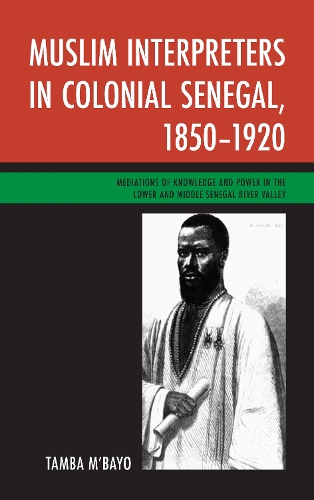
Muslim Interpreters in Colonial Senegal, 18501920: Mediations of Knowledge and Power in the Lower and Middle Senegal River Valley
(Paperback)
Available Formats
Publishing Details
Muslim Interpreters in Colonial Senegal, 18501920: Mediations of Knowledge and Power in the Lower and Middle Senegal River Valley
By (Author) Tamba M'bayo
Bloomsbury Publishing PLC
Lexington Books
12th April 2019
United States
Classifications
Professional and Scholarly
Non Fiction
African history
Islam
History of religion
966.301
Physical Properties
Paperback
234
Width 153mm, Height 221mm, Spine 18mm
358g
Description
This book investigates the lives and careers of Muslim African interpreters employed by the French colonial administration in Saint Louis, Senegal, from the 1850s to the early 1920s. It focuses on the lower and middle Senegal River valley in northern Senegal, where the French concentrated most of their activities in West Africa during the nineteenth century. The Muslim interpreters performed multiple roles as mediators, military and expeditionary guides, emissaries, diplomatic hosts, and treaty negotiators. As cultural and political powerbrokers that straddled the colonial divide, they were indispensable for French officials in their relations with African rulers and the local population. As such, a central concern of this book is the paradoxical and often contradictory roles the interpreters played in mediating between the French and Africans. This book argues that the Muslim interpreters exemplified a paradox: while serving the French administration they pursued their own interests and defended those of their local communities. In doing so, the interpreters strove to maintain some degree of autonomy. Moreover, this book contends that the interpreters occupied a vantage position as mediators to influence the construction of colonial discourse and knowledge, because they channeled the flow of information between the French and the African population. Thus, Muslim interpreters had the capacity to shape power relations between the colonizers and the colonized in Senegal.
Reviews
Tambo Mbayos study of Muslim interpreters in colonial Senegal is an important contribution to a growing literature on the role African intermediaries played in the elaboration and operation of the colonial state. Of these intermediaries, the most important were the interpreters. Mbayo argues that they were important as cultural brokers, as diplomats and emissaries, as the voice of the regime, and as a source of information to colonial rulers about the peoples being governed. -- Martin Klein, University of Toronto, Emeritus
Muslim Interpreters is a valuable and welcome addition to the literature on African intermediaries under colonial rule. Dr. Mbayo marshals a vast array of archival and oral sources to describe the role of Muslim interpreters as the French moved from their outpost of Saint-Louis to expand their domination along the Senegal River valley and the hinterland of Senegal. Moving beyond the simplistic resistance/collaboration binary the book highlights the role of interpreters not only as go-between between colonizers and colonized but also as producers of knowledgewith significant influencein colonial decision making. -- Cheikh Anta Babou, University of Pennsylvania
Author Bio
Tamba Mbayo is assistant professor of history at West Virginia University.
